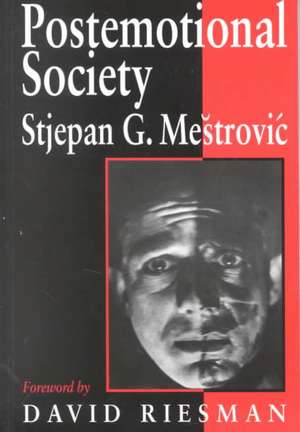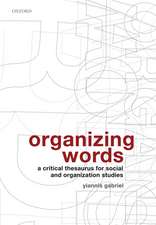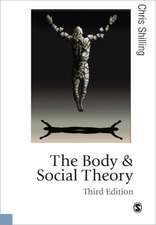Postemotional Society
Autor Stjepan Mestrovicen Limba Engleză Paperback – 22 dec 1996
Introducing a new term to the sociological lexicon: 'postemotionalism', Stjepan Mestrovic argues that the focus of postmodernism has been on knowledge and information, and he demonstrates how the emotions in mass industrial societies have been neglected to devastating effect.
Using contempoary examples, the author shows how emotion has become increasingly separated from action; how - in a world of disjointed and synthetic emotions - social solidarity has become more problematic; and how compassion fatigue has increasingly replaced political commitment and responsibility. Mestrovic discusses the relation between knowledge and the emotions in thinkers as diverse as Durkheim, Baudrillard, Ritzer, Riesman, and Orwell.
This stimulating and provocative work concludes with a discussion of the postemotional society, where peer groups replace the government as the means of social control.
Preț: 513.14 lei
Preț vechi: 603.69 lei
-15% Nou
Puncte Express: 770
Preț estimativ în valută:
98.19€ • 102.52$ • 81.26£
98.19€ • 102.52$ • 81.26£
Carte tipărită la comandă
Livrare economică 04-18 aprilie
Preluare comenzi: 021 569.72.76
Specificații
ISBN-13: 9780761951292
ISBN-10: 0761951296
Pagini: 192
Dimensiuni: 156 x 234 x 13 mm
Greutate: 0.33 kg
Ediția:1
Editura: SAGE Publications
Colecția Sage Publications Ltd
Locul publicării:London, United Kingdom
ISBN-10: 0761951296
Pagini: 192
Dimensiuni: 156 x 234 x 13 mm
Greutate: 0.33 kg
Ediția:1
Editura: SAGE Publications
Colecția Sage Publications Ltd
Locul publicării:London, United Kingdom
Recenzii
As Mestrovic rightly notes, the missing ingredient in most sociological theorising is the role of the emotions. In this respect, Postemotional Society exemplifies both the importance and the dilemmas involved in the sociological study of emotions in social life... Drawing upon an eclectic variety of sources, from Durkheim to Baudrillard, Riesman to Ritzer, Doestoevsy to Orwell, Mestrovic argues that modernity's diametrically opposed tendencies towards order and chaos have resulted in a new hybrid world of rationally ordered, McDonaldised emotions... An insightful, thought-provoking book.
A valuable and stimulating learning experience... accessible, finely written, passionate and important.
A valuable and stimulating learning experience... accessible, finely written, passionate and important.
Cuprins
Foreword - David Riesman
Introduction
The End of Passion?
Recontextualizing David Riesman's <i>The Lonely Crowd
The Authenticity Industry
The Disappearance of the Sacred
Death and the End of Innocence
Conclusions
The Final Triumph of Mechanization
Introduction
The End of Passion?
Recontextualizing David Riesman's <i>The Lonely Crowd
The Authenticity Industry
The Disappearance of the Sacred
Death and the End of Innocence
Conclusions
The Final Triumph of Mechanization
Notă biografică
Descriere
Introducing a new term to the sociological lexicon: `postemotionalism', Stjepan G Me[inverted ci]strovi[ac]c argues that the focus of postmodernism has been on knowledge and information, and he demonstrates how the emotions in mass, industrial societies have been neglected to devastating effect.
Using contempoary examples, the author shows how emotion has become increasingly separated from action; how - in a world of disjointed and synthetic emotions - social solidarity has become more problematic; and how compassion fatigue has increasingly replaced political commitment and responsibility. Me[inverted ci]strovi[ac]c discusses the relation between knowledge and the emotions in thinkers as diverse as Durkheim and Baudrillard











